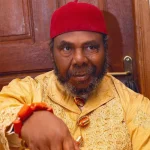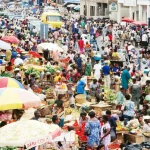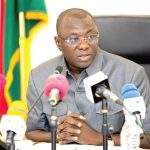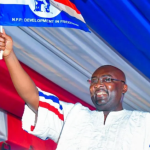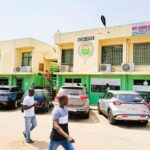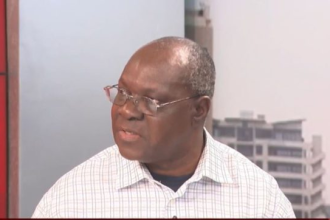The June 4, 1979 Uprising—The Hard Truth:
The June 4 Uprising was a revolt by the Armed Forces of Ghana to address the ills of the Ghanaian society that arose out of combination of factors such as high cost of living, economic hardship, social repression, Kalabule that led to high inflation and high cost of goods and services as well as institutionalized corruption among the elite class of society and the ruling Military hierarchy that had promised to transform the Ghanaian economy by implementing social policies and programs that will have direct impact on sustainable livelihood development of the ordinary Ghanaian which in effect would alleviate poverty and economic hardship of the suffering masses. But in effect the Military Junta of SMC 1 led by Gen. Kutu Acheampong and SMC 11 led by Gen. Akuffo failed to address these challenges of the Ghanaian people.
This development led to frustration among the Ghanaian public and misunderstanding within the Ghanaian Army.
The event of June 4 was not a coup d’état as it was described but a popular uprising. It was a call and crusade for national unity against bad leadership and economic mismanagement. It was a crusade of national redemption from bad governance articulated by the Ghanaian people to create social class systems of leadership that will further entrench a sense of patriotism and nationalism within the Ghanaian society. So, it was not a coup but a social revolution that sort to entrench social contract principles of governance within the body politic of political administration of Ghana..
A coup d’état is when a Military junta overthrows a Civilian government. But In the case of June 4, it was a Military take over from another Military government that reflected the desires and aspiration of the Ghanaian people. It represented the spirit of the Ghanaian people hence a popular uprising by uproar of Ghanaian people.
The June 4 was birthed by the Mutiny on 15th May, 1979 where some Junior Officers of the Army who were relentless to represent the voice of the masses took it upon themselves to topple the SMC 11 Government that was perceived as corrupt, which failed to improve the livelihood of the suffering masses and the sinking image of the military, The quest to achieve this goal was abortive so officers including flight Lt JJ Rawlings were arrested and put before trial. Their main concern of the conspirators of June 4 uprising was the corruption among the High Ranked Military Government whiles majority of Ghanaians continue to suffer under economic hardship and abject poverty. So, the events that birthed the popular uprising were as a result of bad governance and institutionalized corruption.
During these periods, there was shortage of foodstuffs, groceries and many products and provision for livelihood were scarce which people termed as “Kalabule” (Hording of goods and services) where the rich was getting more richer and the poor was getting more poorer. There was no middle class. In the light of this, the mutiny and the popular uprising which attracted, the academia, students, market men and women, professionals like teachers, doctors, lawyers, Civil society organizations and the grassroot sort to tackle these ills that had crippled the Ghanaian economy by bridging the Gap between the rich and the poor by creating a classless society where supply of goods and services will be accessible to all.
When the mutiny failed on May 15, the gallant officers including JJ Rawlings were put before trial. The climax of the trial was that the state prosecutor who was responsible for the prosecution of Rawlings and others on the charge sheet, re-echoed the spirit of the mutiny by giving reasons why these officers embarked on the mutiny to restore confidence in the Ghanaian people of good governance against bad governance. He said “Mr. President, the first accused JJ Rawlings had for a long time felt disillusioned about injustice in our society, more particularly the Acheampong regime and so when in July 1978 when the SMC was reconstituted with removal of Acheampong as Head of State, JJ Rawlings thought things were going to improve but not and when he realized that there was no improvement in the general condition of the Ghanaian people, he was struck with dismay and lamented over what he termed as “the tarnished image of the armed forces”. He regretted that at the time when the military junta is due to hand over to a civilian regime, , the military had done nothing to improve the image of the armed forces.
The prosecution rather won support of JJ Rawlings and colleagues and one prosecution witness confessed Rawlings had declared he was ready to die for his colleagues and when Rawlings was given the opportunity to speak, He owned the mutiny by his popular proclamation that “Leave my men alone, I am responsible. He turned the trial against the Military government by accusing it of massive corruption and requesting that his fellow accused be set free. JJ diatribe resonated with the entire nation as there was massive suffering, abject poverty and economic hardship within the Ghanaian society..
In the night of June 3, 1979 whiles Rawlings and his peers were incarcerated for sentencing, Junior officers including Boakye Gyan broke into the jail where Rawlings was being held and freed him and ostensibly marched him to the National Radio station to make announcement of AFRC take over and requested all military officers to meet with them at the Nicholson stadium in Burma camp. The entire nation went uproar with the slogan “power to the people”. The Senior Military officers and the Military Junta who were involved in corrupt practices during their tenure of office including Gen. Acheampong, Akuffo, Kotey, Utuka, Afrifa and others were put before trial and subsequently executed by firing squad when they were pronounced guilty of all charges preferred against them.
So, the event of June 4 and its success story cannot be overruled in the annals of Ghanaian politics. Although there were excesses, the event served a purpose for the good of the Ghanaian people. The event birthed a principle of probity, accountability, honesty, integrity and social justice which are tenet of democratic development and social contract between government and citizens. This was because there was deep seated corruption within the military government of SMC, political mismanagement, arbitrary price increase of goods and services, hording, indiscipline and abject poverty among the Ghanaian people. These principles of the Uprising sort to sanitize these prevailing adverse conditions of economic mismanagement hence, the event ended the dark days which Ghanaians found themselves.
Is Ghana a Failed State?
All though the AFRC was short lived by transferring power to a Civilian government to continue with the reforms, it came back through the 31st December, 1981 Coup D’état to implement its social policies and programs which the civilian government failed to do and entrench the principles of probity, accountability and social justice in the body politic of Ghana .
There has been much commentary about this coup as unjustifiable because it toppled a civilian government, but the Leadership of the PNDC led by JJ Rawlings proved critics wrong beyond reasonable doubt by entrenching the principles of probity, accountability, honesty, integrity and social justice in the body politic of Ghanaian society by addressing the challenges the country was faced with.
The PNDC implemented the Structural Adjustment Program (SAP) and the Economic Recovery Programs as well as Educational Recovery Programs and by 1984 these programs had yielded dividends. The IMF that gave Ghana a bail out of economic hardship during the 1983 drought cited Ghana as one of the best Economies in Africa.
The infrastructural gap was reduced by rapid expansion of electricity and water to rural communities to lessen rural urban migration, railway development projects to enhance the movement of cocoa from rural communities to urban communities and cocoa roads to enable farmers to cart cocoa from their farms to urban communities to which Ghana became the leading producer of cocoa in the world by 1982. Agriculture was at its peak and professionals such as teachers and doctors who had fled Ghana to seek greener pastures abroad in countries like Nigeria all returned to contribute their quoter in Nation building. Through this adventure of selflessness, commitment to make Ghana a beacon of hope for Africa by the AFRC/PNDC birthed the 4th Republic to entrench democratic principles in the governance of Ghana.
Against this backdrop, Leadership today is a mere shadow of the principles that birthed the June 4. We have lost the sense of responsibility of holding our leader accountable through social contract. The purpose of the June 4 uprising has been defeatist because there is deep seated institutionalized corruption among the political elite, economic hardship, youth unemployment, social repression, political oppression and rented media which cannot probe the irregularities in society. Under the guise of democracy, politicians who entered politics with nothing, have everything at their disposal while majority of the populace continue to live in abject poverty.
Politicians have used democracy to amass wealth grabbing everything they lay their hands on and it’s very worse in within the current leadership whiles the ordinary Ghanaian cannot afford 1 square meal. Ghana today is fraught with property owning democracy where politicians are amassing wealth at the blind side of their followers and sharing the booty among their family members.
The events that inspired the June 4 uprising are events of Ghana today. There is high inflation, high cost of living, social repression, political oppression, youth unemployment, institutionalized corruption, frivolous expenditure by the executive while the masses suffer in abject poverty and return of criminal libel in guise where political opponents are arbitrarily arrested and persecuted. The USA Intelligence Report on Ghana has confirmed this adverse development of human right abuses. The Hallmark of Leadership today are unjustifiable killings of civilians, extra judicial killings by police in Ghana which perpetrators have not been brought to book and government have failed to investigate to core. The 4th estate media, clergy, opinion leaders, CSO’S that were vociferous in the past are silent about these abuses and hardship.
So, The arrested conspirators of June 4 including Rawlings stood for the will of the people and the trial further highlighted their desire to defend the will of the ordinary people. So the June 4 was a spontaneous reaction to the events of 15 May and the trial of the conspirator that took place. It indeed reflected the will of the people and whiles those who chose the path of distorting this history and narrative out of political expedience have done so to the detriment of our political fabrique that made Ghana a beacon of hope for Africa during these difficult periods.
And according to Walter Rodney, Liberal Research Institute from Guyana who researched into the events of June 4 and 31st December 1981 revolution, “Rawlings represented the will of the masses”. So, the spirit of June 4 will forever reign supreme in the annals of Ghana politics. No history can distort the success story of June 4; it speaks volume of selfless leadership and commitment to serve the will of the masses and the country at large through social contract.
As those who tried to distort this truth did so, the national call for drastic change was overwhelming. The event of May 15 was an antecedent of June 4 which brought difficulties facing the nation to the fore and challenged the youth particularly student groups and junior ranks of the Armed Forces and the country at large to take their destiny into their hands and change the course of Ghanaian history which today is suppressed by political corruption among the political elite.
As we commemorate this day, the 43rd Anniversary of June 4, we cannot forget events of that period and why June 4 happened. Ghana is at the cross road and citizens must continue to demand for probity, accountability, honesty, integrity, and social justice from leadership and greedy politicians who rides on the back of the ordinary citizens to enrich themselves while others live in abject poverty. This will make politics relevant to the course of the suffering masses.
“Truth is one and Truth cannot be adulterated. No matter how lie runs faster, someday, the truth shall overcome it because truth is Life”—Jerry John Rawlings.
It’s a passing torch, it’s not an easy road and who fix it knows.
Rest in Peace! Neho JJ Rawlings and Rise in Glory on the Resurrection Day! Now praise ye Great and Famous Men the Fathers named in story. Ahhoa!
Dr. Michael Richmond Smart-Abbey is a Writer and Author of fictional and Non-fictional books, an Historiographer, Christian Theologian, Political Analyst, Governance Expert, Social Development Consultant, Security Intelligence Expert and Consultant in Organizational Security Management.
(BA, Hons, Political Science with History, University of Ghana)
Master of Divinity, Christian Leadership University, USA,
Doctor of Theology, ThD., Asia Pacific College of Theology, Philippines
Doctor of Philosophy, PhD, Christian Philosophy, Christian Leadership University, USA
( Executive and Executive Advanced Executive Certificate in Security Intelligence and Forensic Studies, Knustford University College
and General Certificate of Training, Sabrewatch International Security Training School, UK),
Smartabbeymichael2404@gmail.com
Tel. 0504272091




